Feeling sluggish, fatigued, and just not your best? In today's world of processed foods, environmental toxins, and chronic stress, many Americans look for natural ways to support their body's detoxification systems and reclaim vitality. Enter Moringa oleifera - a nutrient-packed superfood that's taken the wellness world by storm. But with so much hype and misinformation out there, it can be hard to separate fact from fiction when it comes to moringa and detoxification.
In this comprehensive guide, we'll examine evidence-based ways in which moringa supports the body's natural cleansing processes, provide practical tips on incorporating it into your routine, and answer all your burning questions about this "miracle tree." Whether you're a die-hard health enthusiast or just dipping your toes into the world of detox, read on to discover the real power of moringa.
Before we dive into moringa's role, let's clarify what we actually mean by "detoxification". In short, detoxification refers to your body's built-in systems for neutralizing and eliminating potentially harmful compounds, as the National Center for Complementary and Integrative Health (NCCIH) explains. This complex process involves multiple organs:
In a perfect world, these systems would run smoothly 24/7. But in reality, factors like a poor diet, environmental pollutants, medications, and stress can all place an extra burden on your body's natural detox pathways. Over time, this can lead to a buildup of toxins, leaving you feeling fatigued, bloated, and just plain "bleh".
That's where targeted nutritional support comes in. While no food or supplement will magically "detox" you overnight, certain nutrients can help your hardworking organs do their jobs more efficiently. Enter Moringa oleifera.
Native to the foothills of the Himalayas, the moringa tree has been used for centuries in Ayurvedic medicine. But in recent years, it's the nutrient profile of moringa's small, vibrant green leaves1 that's earned it superfood status:
Impressive, right? Moringa packs an incredibly diverse array of vitamins, minerals, antioxidants, and amino acids - many of which play key roles in supporting your body's natural detoxification processes. At MoringaPowderOrganic.com, we aim to bring you the purest, most potent organic moringa leaf powder to help you thrive.
So how exactly does moringa support detoxification? Let's break down the key mechanisms, backed by scientific studies:
Moringa is brimming with potent plant compounds called polyphenols, most notably quercetin and chlorogenic acid. These antioxidants neutralize harmful free radicals and reduce oxidative stress, a key player in toxin-related damage.
One 2014 study published in the Journal of Food Science and Technology found that daily consumption of moringa leaf powder significantly increased blood antioxidant levels in postmenopausal women. By bolstering your body's antioxidant defenses, moringa helps protect your detox organs from the daily onslaught of dietary and environmental toxins.
Your liver is like the ultimate multitasker—it filters toxins from your blood, aids digestion, and regulates blood sugar and cholesterol. Moringa contains a compound called naringin that acts similarly to silymarin, the active component in milk thistle (a well-known liver-supporting herb).
A 2019 animal study published in Heliyon discovered that moringa extract helped protect the liver against acetaminophen toxicity. While more human research is needed, this suggests moringa could be a valuable ally for your hardworking liver.
Chronic inflammation and detoxification are closely connected. When your body is in a constant state of low-grade inflammation, it can impair liver function and make it harder to eliminate toxins efficiently.
Moringa's rich array of anti-inflammatory compounds, including isothiocyanates and flavonoids, may help quell inflammation and take some of the burden off your detox pathways. One small human study published in the International Journal of Molecular Sciences found that supplementing with moringa for 3 weeks significantly reduced inflammatory markers.
Many of the vitamins and minerals abundant in moringa - like vitamin C, vitamin B6, and magnesium - act as essential cofactors for your body's detoxification enzymes. In other words, they provide the nutritional raw materials your liver needs to carry out its detox duties. For example, vitamin C is crucial for the production of glutathione, a powerful antioxidant.
By supplying a balanced array of these nutrients, moringa offers comprehensive support for your body's natural cleansing processes. Unlike harsh "cleanses" that can deplete your system, moringa nourishes your detox pathways.

Making Moringa Part of Your Detox Routine
Ready to start harnessing the detox-supportive power of moringa? Here's your complete guide:
Not all moringa powders are created equal. To reap maximum benefits, look for a brand that is certified organic, made from pure, shade-dried leaves, sourced ethically, and tested for purity. If you're unsure where to start, we've created a detailed guide on how to choose the best moringa powder.
At MoringaPowderOrganic.com, we partner with small family farms in the fertile soils of Kenya to bring you the most nutrient-dense, non-GMO moringa powder on the market, like our popular Pura Vida Moringa Powder. Our leaves are carefully harvested at peak potency, shade-dried to preserve their superfood goodness, and never irradiated.
When it comes to moringa dosage, starting low and going slow is important, allowing your body to adjust. We recommend a maximum daily intake of 10 grams of moringa powder. Here's a suggested schedule:
If you have a sensitive stomach, you may want to start with just 1/4 teaspoon (approximately 1.25 grams) and very gradually increase the amount, always staying within the 10-gram daily limit.
The beauty of moringa powder is its versatility! Some simple ways to incorporate it:
For more creative ideas, check out our guide on the best ways to use moringa powder daily.
Pro tip: Moringa has an earthy, slightly spinach-like taste that's easily masked in smoothies or flavorful savory dishes. Embrace those natural green vibes!
Ready to get creative in the kitchen? Try these delicious, detox-supportive moringa recipes to jumpstart your wellness journey:
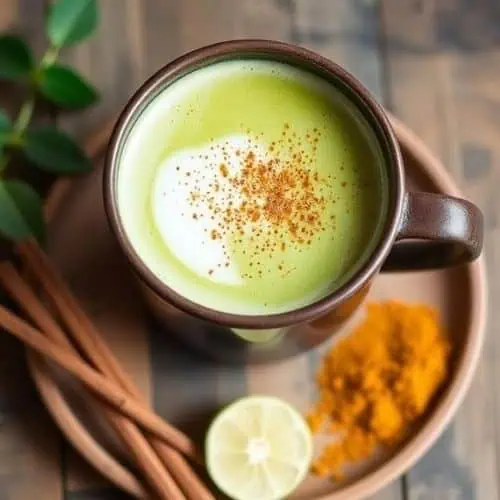
This warming, spiced latte is the perfect way to start your day with a dose of detox-supportive nutrients.
Ingredients:
Instructions:
Pro tip: For a creamier latte, blend the heated mixture in a high-speed blender for 30 seconds before pouring into your mug.
Using Moringa Capsules:
For easier calculation, use our Moringa Powder Dosage Calculator!
Important Considerations (for Both Powder and Capsules):
You've got questions, we've got answers! Here are some of the most common queries we hear about moringa and detoxification:
The term "detox" gets thrown around a lot these days, often attached to questionable juice cleanses or "miracle" supplements. So we understand the skepticism! To be clear, no food or supplement can magically "detox" your body overnight.
However, natural ingredients like moringa can absolutely support your body's innate detoxification pathways by supplying key nutrients. So while moringa won't instantly transform your body, it can be a powerful addition to a balanced, whole-foods-based approach to detox. Want to learn even more? Explore the numerous benefits of moringa powder.
Moringa is generally very safe and well-tolerated. However, some people may experience mild digestive discomfort like bloating or loose stools, particularly when starting with too high a dose. For a full breakdown, read our guide on moringa side effects.
If this occurs, reduce your intake and slowly work your way back up. Those taking medication for diabetes or high blood pressure should talk to their doctor first, as moringa may enhance the effects of these drugs. As with any supplement, cease use if you experience any concerning symptoms and consult your healthcare provider.
Remember, detoxification is an ongoing process, not a one-time event. Most people start to notice improvements in energy, digestion, and overall well-being within a few weeks of consistent moringa use. But the real magic happens when you make moringa part of your long-term wellness routine.
At MoringaPowderOrganic.com, we don't believe in quick fixes or empty promises. We're here to support your health journey for the long haul with the highest quality organic moringa powder.
In a world of wellness fads and quick fixes, moringa stands out as a time-tested, scientifically-validated superfood that can genuinely support your body's natural detoxification processes. By providing a potent blend of antioxidants, anti-inflammatory compounds, and essential nutrients, moringa acts as a gentle, nourishing ally in your detox journey.
But here's the key: consistency. Just like you can't undo years of less-than-stellar eating habits with a 3-day juice cleanse, the benefits of moringa build over time with regular use. By incorporating this green goodness into your daily routine, alongside a colorful whole-foods diet, you'll be giving your hard-working detox organs the support they need to thrive.
Ready to experience the difference2 of pure, potent organic moringa? Visit [MoringaPowderOrganic.com](link3 to shop) now to stock up and receive 15% off your first order with code DETOX15. Your body will thank you. For an even wider selection, consider our Way4Organic Moringa Oleifera Leaf and Seed Powder.
In today's fast-paced world, chronic stress is a prevalent issue, affecting both our mental and physical health. If left unmanaged, stress can lead to anxiety, depression, fatigue, brain fog, and a host of other issues that can significantly impact your quality of life.
In today's fast-paced world, chronic stress is a prevalent issue" is a common opening. Consider a more unique hook. For instance, you could start with a brief, compelling anecdote or a surprising statistic about stress.
Stress relief isn’t one-size-fits-all, but nature offers excellent solutions! Moringa oleifera is a nutrient-rich plant celebrated in traditional medicine. Explore how Moringa can help ease stress and enhance your mental well-being!
Moringa oleifera is a nutrient-dense tree, often called the "drumstick tree," and has a long history in traditional medicine. For a comprehensive overview of Moringa's origins, cultivation, and general uses, see our article [about Moringa generally] OR about Moringa's many benefits.
This guide highlights Moringa's role in alleviating stress and enhancing mental well-being, attributed to its unique combination of nutrients and adaptogenic properties.You can find more general information about Moringa oleifera on the Wikipedia page.
Moringa, a versatile plant, is available in several forms, each with its benefits and uses:
One of the key reasons for Moringa's popularity is its extraordinary nutrient density. Gram for gram, Moringa leaves contain:
Beyond these essential nutrients, Moringa is a rich source of antioxidants, including flavonoids, polyphenols, and ascorbic acid. These antioxidants play a role in shielding cells from oxidative stress, which is a crucial contributor to the body's response to stress.
Learn more about the 10 Benefits of Moringa Powder.
Oxidative stress is a matter of balance. It arises when the equilibrium between oxidants and antioxidants in our bodies is disrupted, potentially leading to various health issues. By understanding the mechanisms of oxidative stress, we can identify effective strategies for maintaining optimal health and well-being.
Moringa is high in antioxidants such as flavonoids, polyphenols, and vitamin C, which assist the body in fighting oxidative stress, lowering inflammation, and enhancing overall health and resilience.
Moringa is also a good source of magnesium, a mineral crucial for nervous system function.
Magnesium aids in regulating neurotransmitters, the chemical messengers that transmit signals between the brain and the body. Sufficient magnesium intake has been associated with decreased symptoms of stress, anxiety, and depression.
A 2017 review published in the journal Nutrients found that magnesium supplementation can significantly reduce subjective measures of anxiety. While more research is needed, incorporating magnesium-rich foods like Moringa into your diet may promote a sense of calm and well-being.
Adaptogens are a class of herbs and mushrooms that help the body adapt to stress by regulating the hypothalamic-pituitary-adrenal (HPA) axis, the body's central stress response system. The National Center for Complementary and Integrative Health (NCCIH) provides a good overview of adaptogens. When we encounter a stressor, the HPA axis kicks into gear, triggering the release of cortisol and other stress hormones.
While essential for survival, prolonged HPA axis activation can disrupt cortisol regulation, keeping levels elevated even after stress subsides. This can trigger anxiety, depression, insomnia, digestive issues, and a weakened immune system.
Adaptogens work by helping to balance the HPA axis, allowing the body to mount a more appropriate stress response and return to a state of homeostasis more quickly. They are neither sedatives nor stimulants; they help the body normalize physiological functions in response to stress.
Moringa is considered an adaptogenic herb due to its ability to help regulate cortisol levels. A 2014 study published in the Journal of Ayurveda and Integrative Medicine found that Moringa leaf extract helped reduce cortisol levels in stressed rats, suggesting its potential as a natural stress reliever.
While more human studies are needed to confirm these effects, incorporating Moringa into a well-rounded stress management plan may help promote resilience and balance.
Anxiety, the most common mental health concern in the United States, affects 40 million adults annually. Moringa, known for its adaptogenic properties, may offer some relief, as these properties help the body manage stress, a key contributor to anxiety. The Anxiety & Depression Association of America (ADAA) is a good resource for information on anxiety disorders.
While effective treatments like therapy and medication are available, some individuals may prefer to explore natural options as a complementary approach.
Research published in Phytotherapy Research (2018) revealed that Moringa leaf extract possesses anxiolytic properties—meaning it reduces anxiety—in mice, with effects comparable in effectiveness to the prescription drug diazepam. 1 Researchers believe these benefits stem from the plant's abundance of polyphenols, antioxidants that support brain health and mood by potentially reducing inflammation and oxidative stress
Another study, published in the Journal of Ayurveda and Integrative Medicine in 2016 found that Moringa leaf extract improved symptoms of depression and anxiety in postmenopausal women. Women who added Moringa to their routine noticed noticeable improvements in mood, energy levels, and overall quality of life compared to those in the placebo group.
These findings are promising, but we must remember that research on Moringa is still limited. We need more detailed studies to understand how Moringa can help with anxiety and mood support. It's important to note that Moringa should not replace professional medical treatment for anxiety disorders or depression.
Stress and anxiety can take a serious toll on cognitive function, leading to problems with focus, concentration, and mental clarity. In "fight or flight" mode, our brains prioritize survival over higher-order thinking.
Moringa may help support cognitive function by reducing oxidative stress and inflammation in the brain.
A 2019 research published in Oxidative Medicine and Cellular Longevity discovered that Moringa leaf extract enhanced memory and learning in mice with cognitive impairment.
The researchers attributed these effects to Moringa's high antioxidant content, which helped protect brain cells from damage.
A 2012 study published in the Journal of Food Science and Technology found that Moringa leaf extract helped prevent age-related cognitive decline in mice. The mice that received Moringa performed better on memory and learning tests compared to the control group.
While these animal studies are intriguing, more human research is needed to confirm Moringa's effects on cognitive function. However, given its rich array of brain-friendly nutrients, incorporating Moringa into your diet may benefit overall brain health and mental clarity.
The most common way to consume Moringa is in powder form, which can be easily added to various recipes. Discover some of the best ways to use Moringa powder daily.
Dosage
While there is no official recommended dosage for Moringa, most studies have used doses ranging from 500mg to 2,000mg daily. Start with a low dose and gradually increase it as necessary, carefully observing how your body reacts.
A typical serving size for moringa powder is 1-2 teaspoons (around 5-10 grams) per day. You can mix the powder into smoothies, juices, soups, or stews or sprinkle it onto salads or roasted vegetables.
Ingredients:
Instructions:
If you prefer the convenience of capsules, a typical dose is 500-1,000mg per day, taken with food. Be sure to choose a high-quality, reputable brand and follow the dosage instructions on the label.
For Moringa tea, steep 1-2 teaspoons of dried Moringa leaves in hot water for 5-10 minutes. You can enjoy the tea alone or add honey, lemon, or other herbs to taste.
Moringa is generally considered safe when consumed in normal food amounts. However, high doses may cause some people digestive upset, nausea, or diarrhea. It's important to be aware of potential Moringa side effects. If you experience any adverse effects, reduce your dosage or discontinue use.
Moringa may also interact with certain medications, including blood thinners, diabetes drugs, and thyroid medications. If you are pregnant, breastfeeding, or have a medical condition, consult your healthcare provider before using Moringa.
When purchasing Moringa products, look for brands that use organic, non-GMO Moringa leaves and follow strict quality control standards. Learn how to choose quality Moringa powder. Avoid products with added fillers, preservatives, or artificial ingredients.
Look for certifications from third-party organizations like the U.S. Pharmacopeia (USP), NSF International, or ConsumerLab, which test supplements for purity and potency.
Moringa is one of many natural remedies that may help relieve stress and mental well-being. Other popular options include:
Comparison of Moringa, Ashwagandha, Rhodiola, and CBD
| Aspect | Moringa | Ashwagandha | Rhodiola | CBD |
|---|---|---|---|---|
| Primary Function | Nutrient-rich adaptogen with antioxidant properties | Adaptogenic herb from Ayurvedic medicine | Adaptogenic herb that fights fatigue | Non-psychoactive cannabis compound |
| Key Benefits | • Overall health support • Stress reduction • Immune support • Anti-inflammatory | • Reduces cortisol levels • Anxiety relief • Improved sleep quality | • Enhanced mental performance • Fatigue reduction • Increased endurance | • Anxiety relief • Relaxation • Pain management |
| Main Advantages | • Affordable • Easily available • Safe for long-term use • High nutritional value | • Well-researched • Proven effectiveness • Traditional usage | • Fast-acting • Energy-boosting • Natural stimulant | • Strong effects • Various forms available • Targeted relief |
| Limitations | • Mild digestive issues in some cases • Effects may take time | • May affect immune system • Requires medical consultation | • May cause insomnia if taken late • Limited research | • Expensive • Drug interactions • Legal restrictions |
| Cost | Low | Moderate | Moderate | High |
| Safety Profile | Very High | High | High | Moderate |
| Speed of Effect | Gradual | Moderate | Fast | Fast |
| Research Backing | Moderate | Extensive | Moderate | Growing |
| Best For | • Daily wellness • Nutritional support • Gentle stress relief | • Chronic stress • Anxiety • Sleep issues | • Mental fatigue •Physical performance • Daytime energy | • Acute anxiety • Immediate relief • Specific conditions |
**Notes:**
- Cost rating: Low ($) to High ($$$)
- Safety profile: Based on reported side effects and interactions
- Always consult healthcare providers before starting any supplement regimen
- Effects may vary by individual
- Quality and source of product can significantly impact effectiveness
Moringa stands out for its exceptional nutrient density and wide range of potential health benefits. While ashwagandha and rhodiola are primarily used for their adaptogenic properties, Moringa offers a comprehensive array of vitamins, minerals, and antioxidants that support overall health and well-being.
CBD, while promising for anxiety and stress relief, can be expensive and may interact with certain medications. Moringa, in contrast, is generally safe, affordable, and easy to incorporate into your daily routine.
The scientific literature on Moringa has focused on several key areas:
Nutritional Composition: Research has confirmed that Moringa leaves are rich in essential nutrients, including protein (up to 30% by dry weight), vitamins (particularly A, B, C, and E), minerals (calcium, potassium, iron, magnesium, and zinc), and all essential amino acids. Studies have documented particularly high levels of antioxidants like quercetin and chlorogenic acid. (Referenced studies and links are included above.)
Medicinal Properties: Scientific studies have investigated several therapeutic applications:
Anti-inflammatory effects: Multiple studies have demonstrated that Moringa contains compounds like isothiocyanates that help reduce inflammation. Research published in Pharmaceutical Biology showed significant anti-inflammatory activity in both acute and chronic models.
Blood sugar regulation: Clinical trials have indicated that Moringa leaf powder may help lower blood glucose levels. A study in the Journal of Food Science and Technology found that diabetic subjects who consumed Moringa showed improved glucose tolerance.
Cardiovascular health: Studies suggest that Moringa may help improve heart health by lowering cholesterol and blood pressure. Research published in the Journal of Ethnopharmacology has documented these heart-protective effects.
Antimicrobial properties: Lab research indicates that Moringa extracts have antibacterial and antifungal properties that can fight various harmful microorganisms.
Safety and Toxicity: Moringa is generally considered safe to eat. However, it's important to note that it might interact with some medications, especially those processed by the liver.
Agricultural Uses: Moringa is also being studied for its potential in sustainable agriculture. It's known to be drought-resistant, grow quickly, and enrich the soil.
"Let's face it - keeping our mental health in check isn't easy, especially these days. I've been exploring different ways to stay balanced, and recently discovered something interesting: Moringa. It's not exactly mainstream yet, but more people are starting to talk about how this natural supplement fits into their stress-management toolkit.
Moringa special: it's packed with nutrients that help your body deal with stress, plus it seems to help with mood and brain function too. Think of it as your body's backup generator when stress starts draining your batteries. The antioxidants and vitamins in this stuff actually help protect your brain cells and keep you thinking clearly.
Are you ready to enjoy the benefits of Moringa? Start with a Moringa Smoothie to reduce stress, or find other ways to add this superfood to your daily routine. Moringa has a mild, earthy taste and a bright green color, making it an easy and powerful addition to a healthy lifestyle.
Are you ready to enjoy the benefits of Moringa? Start with a Moringa Smoothie to reduce stress, or find other ways to add this superfood to your daily routine. Moringa has a mild, earthy taste and a bright green color, making it an easy and powerful addition to a healthy lifestyle.
Ready to experience the benefits of Moringa? Shop our selection of high-quality Moringa products now.
Maintaining strong, healthy bones is essential for overall health and quality of life, especially as we age. While calcium and vitamin D are well-known nutrients for bone health, there's a rising star in the world of natural bone support: moringa.
Moringa oleifera, also known as the "miracle tree" or "drumstick tree", is a plant native to India that has been used for centuries in traditional medicine to treat a variety of ailments. In recent years, scientific research has begun to validate many of these traditional uses, including moringa's potential benefits for bone health.
In this comprehensive guide, we'll dive deep into the science of how moringa supports bone strength and density, examine the practical ways you can incorporate moringa into your diet, and compare it to other natural solutions for bone health. Whether you're looking to prevent bone loss, manage existing bone conditions, or simply optimize your bone health, read on to learn how moringa may be able to help.
One of the key ways moringa supports bone health is through its impressive array of bone-building nutrients. Here's a breakdown of some of the most important ones:
| Nutrient | Amount per 100g dried leaves | % Daily Value |
| Calcium | 2,003 mg | 200% |
| Phosphorus | 204 mg | 20% |
| Magnesium | 368 mg | 92% |
| Vitamin K | 254 mcg | 318% |
| Potassium | 1,324 mg | 28% |
| Vitamin C | 17.3 mg | 29% |
As you can see, moringa is an excellent source of calcium, providing a whopping 200% of the recommended daily intake in just 100 grams of dried leaves. Calcium is the main mineral found in bones and is essential for maintaining bone mass.
Moringa also contains high levels of phosphorus and magnesium, two other crucial minerals for bone health. Phosphorus works together with calcium to build strong bones, while magnesium helps regulate calcium metabolism and is necessary for proper bone mineralization.
Vitamin K is another standout nutrient in moringa that's critical for bone health. It activates osteocalcin, a protein that binds calcium to bones. Studies have shown that vitamin K deficiency is associated with lower bone density and increased fracture risk.
In addition to these key nutrients, moringa provides potassium, which may help neutralize acid load and reduce calcium loss from bones, as well as vitamin C, which is necessary for collagen production - the main protein found in bones.
While research on moringa and bone health is still emerging, several promising studies have been conducted in recent years:
It's important to note that most of the research so far has been done in animals or in vitro, so more human studies are needed to confirm these effects. However, the existing evidence points to moringa's potential as a natural agent for promoting bone health.
In addition to its direct effects on bone metabolism, moringa may also support bone health indirectly through its potent antioxidant and anti-inflammatory properties.
Oxidative stress and inflammation are involved in the development of osteoporosis and other bone disorders. Moringa contains a wide range of antioxidant compounds, such as flavonoids and phenolic acids, that can help combat oxidative damage in the body.
Moreover, studies have shown that moringa has anti-inflammatory effects, which may help protect against bone loss associated with chronic inflammation. For example, a 2019 study found that moringa reduced markers of inflammation and oxidative stress in arthritic rats, leading to improved bone health.
Moringa is available in several forms, each with its own benefits and considerations:
Currently, there is no official recommended dosage of moringa for bone health. Studies have used a wide range of doses, from 500 mg to 8 grams per day. You can learn more about finding the right amount for your needs with our Moringa Powder Dosage Calculator
As a general guideline, many moringa supplements suggest taking 500-1,000 mg (about 1/2-1 tsp) of moringa powder daily. However, it's always best to start with a lower dose and gradually increase as tolerated.
It's also crucial to talk to your healthcare provider before starting moringa, especially if you have any health conditions or are taking medications. They can help you determine an appropriate dosage for your individual needs.
Beyond taking supplements, there are many delicious ways to incorporate moringa into your daily diet. Here are a few ideas:
The earthy, slightly bitter taste of moringa pairs well with strong flavors like ginger, turmeric, cocoa, and citrus. Start with small amounts and adjust to your liking.
While moringa is a promising natural solution for bone health, it's certainly not the only one. Here's how it compares to some other common remedies:
| Category | Subject | Pros | Cons |
|---|---|---|---|
| Supplements | Calcium Supplements | Easy and effective way to get calcium; readily available. | Potential side effects (kidney stones, cardiovascular issues in high doses); may not be well absorbed by all. |
| Vitamin D Supplements | Best way to ensure adequate vitamin D levels (critical for calcium absorption). | Moringa is not a significant source of Vitamin D. | |
| Moringa | Moringa (vs. Calcium) | Provides calcium and other bone-supporting nutrients in a natural, whole-food form (potentially better absorption). | Lower concentration of calcium than supplements; best as a complementary strategy. |
| Moringa (vs. Vitamin D) | Contains other nutrients (magnesium, vitamin K) that work synergistically with vitamin D and calcium. | Not a significant source of vitamin D; supplementation and sun exposure are still needed. | |
| Other Natural | Other Natural Remedies (Red Clover, Sea Buckthorn, Pomegranate, Leafy Greens) | Each offers a unique profile of beneficial compounds for bone health. | None specifically mentioned, comparison is more about Moringa's overall nutrient density. |
| Holistic approach | Holistic Bone Health | Combine various nutrients, excersise and suplements. | Not a magic bullet on its own. |
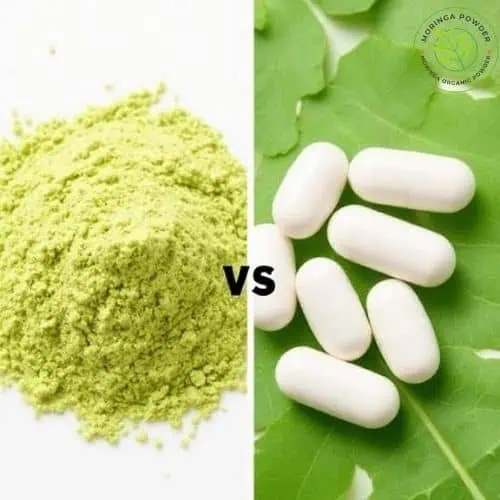
Calcium supplements are often the first line of defense against bone loss, and for good reason - they're an easy and effective way to ensure you're getting enough of this critical mineral. However, some people may not absorb calcium supplements well, and there are concerns about potential side effects like kidney stones and cardiovascular issues when taken in high doses.
Moringa, on the other hand, provides not just calcium but a host of other bone-supporting nutrients in a natural, whole-food form. This may make it easier for the body to absorb and use. However, moringa does not have as concentrated a dose of calcium as supplements, so it may be best used as a complementary strategy.

Vitamin D is another essential nutrient for bone health, as it helps the body absorb and use calcium. While moringa does contain some vitamin D, it's not a significant source. Sun exposure and vitamin D supplements remain the best ways to ensure adequate levels.
However, moringa can still be a valuable addition to a bone-healthy diet alongside vitamin D. Its other nutrients like magnesium and vitamin K work synergistically with vitamin D and calcium.
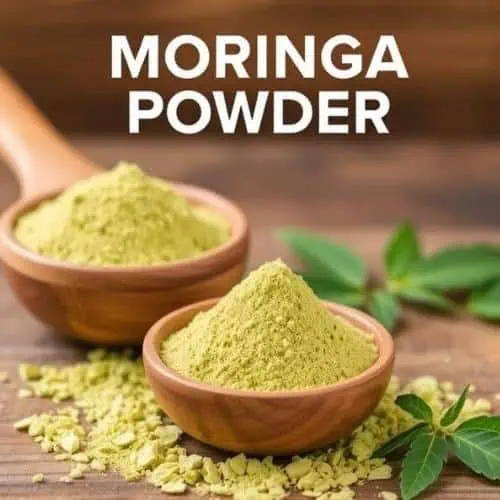
There are many other herbs and foods touted for their bone health benefits, such as red clover, sea buckthorn, pomegranate, and leafy greens. While each of these has its own unique profile of beneficial compounds, moringa stands out for its sheer nutrient density and the growing body of research supporting its potential bone benefits.
Ultimately, the best approach for bone health is likely a holistic one that includes a variety of nutrient-rich foods, weight-bearing exercise, and targeted supplements as needed. Moringa can be a powerful part of this approach, but it's not a magic bullet on its own.
Osteopenia and osteoporosis are conditions characterized by low bone mass and deterioration of bone tissue, leading to increased fracture risk. As mentioned, animal studies have shown that moringa can increase bone density and strength in models of postmenopausal osteoporosis and diabetes-related bone loss.
While more human research is needed, incorporating moringa into a bone-healthy lifestyle may be a useful adjunctive strategy for those with or at risk of these conditions. However, it should not be used as a replacement for medications or other therapies prescribed by a healthcare provider.
Some preliminary animal research suggests that moringa may aid in fracture healing. A 2015 study found that moringa leaf extract enhanced the healing of fractured radius bones in rats, as evidenced by increased bone formation and mineralization markers.
While this is promising, human studies are needed to confirm these effects. Moringa should be seen as a potential complementary measure alongside proper medical care for fractures.
Adequate nutrition is crucial for healthy bone growth and development in children. Some advocates suggest that moringa, with its high nutrient content, may be beneficial for supporting children's bone health.
However, it's important to be cautious when giving moringa or any supplements to children. The safety and appropriate dosage of moringa in pediatric populations have not been well established. It's always best to consult with a pediatrician before giving moringa to children, and to focus on providing a well-rounded, nutrient-rich diet.
Moringa is generally considered safe when consumed in amounts typically found in food. However, as with any supplement, there is the potential for side effects, especially at high doses. Some reported side effects include:
If you experience any adverse effects after taking moringa, stop use and consult your healthcare provider.
Learn more about moringa powder side effects in our detailed guide.
Moringa may interact with certain medications due to its effects on liver enzymes and other biochemical pathways. Some potential interactions include:
Always inform your doctor and pharmacist of any supplements you're taking, including moringa, to avoid potential interactions.
Certain individuals should avoid moringa or use it with caution:
When choosing a moringa supplement, quality is paramount. Look for products that:
Be wary of any product that makes grandiose health claims or seems too good to be true. Moringa is a nutritious food and a promising supplement, but it's not a panacea.
In the search for natural ways to support bone health, moringa emerges as a nutrient-dense, research-backed option. Its unique combination of minerals, vitamins, and plant compounds may work together to promote strong, healthy bones and protect against bone loss.
However, it's important to remember that moringa is not a replacement for a well-rounded diet, regular exercise, and proper medical care. It's a tool that can be used alongside these foundational practices, not a shortcut around them.
If you're considering using moringa for bone health, talk to your healthcare provider first. They can help you weigh the potential benefits and risks, determine an appropriate dosage, and monitor for any adverse effects.
At the end of the day, bone health is a lifelong journey. Incorporating nourishing foods like moringa, staying active, and working with your healthcare team can help you build and maintain strong bones for years to come. With science-backed strategies and a commitment to wellness, optimal bone health is within reach.
Ready to explore the benefits of moringa for your bone health? Visit our shop to discover our selection of high-quality, organic moringa products. Take the first step toward supporting your bone health naturally.
Everyone looks for natural ways to boost immunity in today's health-conscious world. Moringa, often called the "miracle tree," is rapidly gaining popularity in wellness. This nutrient-rich superfood contains vitamins, minerals, and antioxidants that support immune health. This article will explore the science behind moringa's immune-boosting properties and discuss ways to incorporate it into your daily routine.
Moringa's ability to support the immune system stems from its rich concentration of nutrients and bioactive compounds. Here's a closer look at how these components work together to strengthen your body's natural defenses, and you can explore even more about the 10 benefits of moringa powder on our dedicated page.
In addition to its impressive nutrient profile, moringa contains various plant compounds with potent antioxidant and anti-inflammatory properties. These include:
Quercetin is a flavonoid found in moringa that has been shown to have immune-modulating effects. It helps regulate the immune response and may reduce inflammation in the body. Did you know that moringa is being looked at for men's health? Find out more here.
Chlorogenic acid is another potent antioxidant in moringa. It helps neutralize harmful free radicals and may support the body's natural defense mechanisms.
Moringa contains isothiocyanates, sulfur-containing compounds that have been shown to have anti-inflammatory and immune-supporting properties.The many benefits from these compounds are just a part of the 10 benefits of moringa powder.
One of the reasons moringa is such a powerhouse for the immune system is its rich nutrient content. Here are some of the key vitamins and minerals in moringa that support immunity:
Moringa is an excellent source of vitamin C, with one cup of fresh leaves providing nearly 50% of the recommended intake. Vitamin C is a powerful antioxidant that helps protect cells from damage, enhances the production of white blood cells, and supports the body's natural defense mechanisms.
Moringa leaves are also high in vitamin A, with one cup providing over 70% of the daily recommended intake. Vitamin A plays a crucial role in maintaining the health of mucous membranes, which act as a barrier against infections in the respiratory and digestive tracts.
Iron is essential for a robust immune response, and moringa is a good plant-based source of this mineral. Iron helps transport oxygen to cells, including those of the immune system, allowing them to function optimally.
Moringa contains zinc, a mineral critical for immune cell development and function. Zinc deficiency has been linked to impaired immunity and increased susceptibility to infections.
While many supplements are touted for their immune-boosting effects, moringa stands out for its comprehensive nutrient profile and unique plant compounds. Here's how it compares to some other popular immune-supporting supplements:
| Supplement | Pros | Cons |
|---|---|---|
| Vitamin C | Well-researched, inexpensive | High doses may cause digestive upset |
| Echinacea | May reduce cold duration | Mixed research results |
| Elderberry | Antiviral properties | Insufficient evidence for long-term use |
| Zinc | Effective for reducing cold duration | Can cause nausea and taste disturbances |
Moringa offers a natural, whole-food approach to immune support, providing a wide range of nutrients and beneficial plant compounds in one convenient package.
There are several ways to incorporate moringa into your diet for immune support:
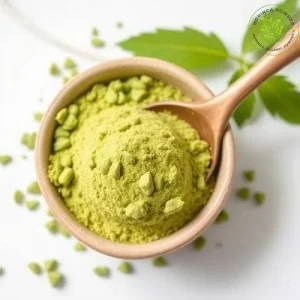
Moringa leaf powder is one of the most convenient ways to consume this superfood. For a nutrient boost, add it to smoothies, soups, or sauces. Aim for 1-2 teaspoons per day. For more ideas and detailed guidance, check out our guide on the best ways to use moringa powder daily.
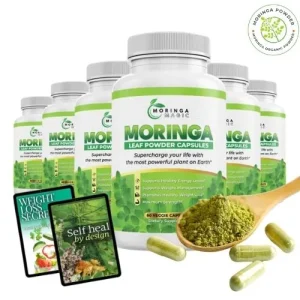
If you prefer the convenience of supplements, moringa capsules are readily available. For more information on this specific product, you can visit the Moringa Magic product page. When choosing a moringa supplement, it's important to look for a high-quality, organic product and always follow the dosage instructions on the label.
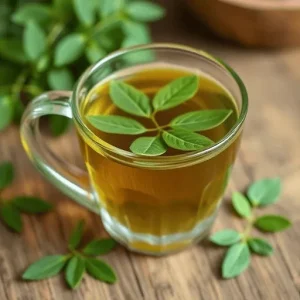
Steep moringa leaves in hot water for a nourishing, immune-supporting tea. You can find moringa tea bags or make your own by steeping 1-2 teaspoons of moringa powder in hot water.
While general guidelines suggest 1-2 teaspoons of moringa powder per day, individual needs can vary. For a precise and personalized dosage recommendation, use our moringa powder dosage calculator.
Try these delicious recipes to boost your immune system with moringa:
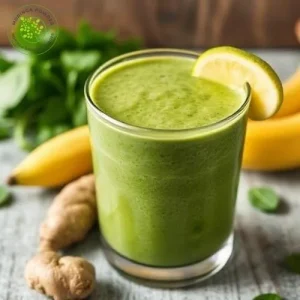
Yields: 1 serving
Prep time: 5 minutes
Cook time: 0 minutes
Total time: 5 minutes
Serving Times: Breakfast, Snack, Post-Workout
Ingredients:
Instructions:
Notes:
This improved recipe provides more detail, including yield, prep/cook/total time, serving time suggestions, more precise ingredient measurements, optional additions for customization, and helpful notes for best results. The serving time suggestions make it clear that this is a versatile recipe suitable for various times of the day.

Yields: 4-6 servings
Prep time: 15 minutes
Cook time: 30 minutes
Total time: 45 minutes
Serving Times: Lunch or Dinner
Ingredients:
Instructions:
Notes:
This revised recipe is more complete and user-friendly. It includes yield, prep time, cook time, total time, serving suggestions, clear ingredient measurements, and helpful notes. The addition of the "serving times" clarifies when the soup is most appropriate to eat.
While moringa is generally considered safe, it's essential to be aware of potential side effects and interactions:
Moringa is a nutrient-dense superfood that offers a natural way to support your immune system. With its impressive vitamin and mineral content, antioxidant properties, and unique plant compounds, moringa is a powerful addition to your wellness routine. Incorporate moringa powder, capsules, or tea into your daily diet, try some delicious recipes, and give your immune system the support it needs to thrive. To start boosting your immunity with moringa, explore our range of premium moringa products. https://www.moringapowderorganic.com/shop/
Moringa tea is brewed from the leaves of the "miracle tree," also known as Moringa oleifera. This ancient beverage has gained popularity recently as a weight loss aid due to its rich nutritional profile and potential health benefits. But what does the science say about moringa tea for shedding pounds and burning belly fat?
This comprehensive guide will explore the research behind moringa tea's weight loss claims. You'll learn how this potent plant may help regulate appetite, boost metabolism, balance blood sugar, and target dangerous visceral fat. Plus, we'll share expert dosage guidelines, delicious recipes, and essential safety information to help you decide if moringa tea deserves a spot in your healthy living arsenal. Get ready to steep your way to a slimmer waistline!
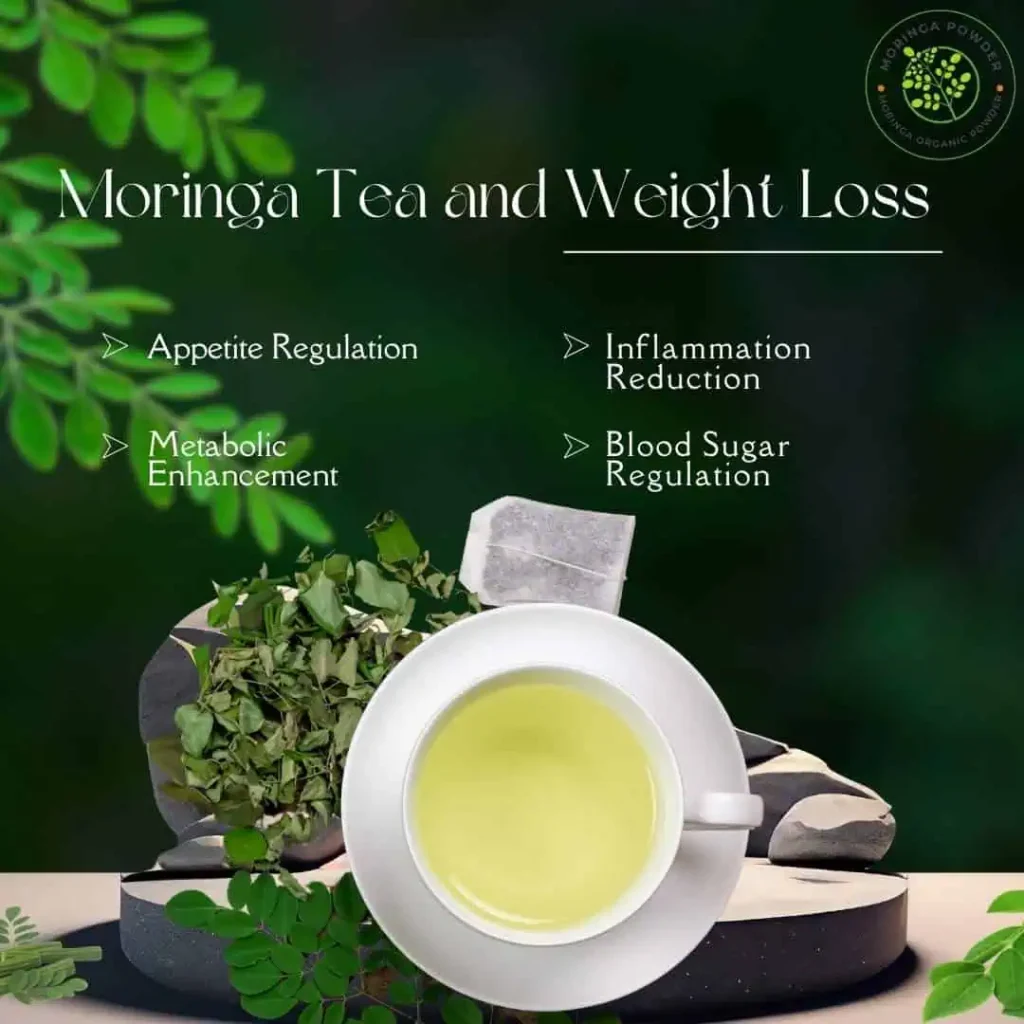
One of the key ways moringa tea may support weight loss is by its potential to regulate appetite. A 2021 study published in the Journal of Functional Foods found that compounds called isothiocyanates in moringa leaves reduced food intake and body weight gain in obese mice by modulating the satiety hormone leptin. While more human research is needed, this promising finding suggests moringa tea could help curb cravings and promote feelings of fullness, giving hope to those struggling with weight loss.
Moringa tea may also empower you by boosting your metabolism, helping your body burn calories more efficiently. A 2014 study in the Journal of Diabetes found that a moringa extract rich in polyphenols increased energy expenditure and fat oxidation in obese rats. The researchers proposed that moringa's antioxidants may activate cellular pathways involved in thermogenesis (heat production) and lipolysis (fat breakdown), giving you more control over your weight loss journey.
Keeping blood sugar levels stable is crucial for weight management, as spikes and crashes can trigger hunger and overeating. Moringa tea shows promise for its blood sugar-balancing effects. A 2020 review in Phytotherapy Research analyzed 16 clinical trials. It concluded that moringa supplementation significantly reduced fasting blood glucose and HbA1c (a long-term marker of blood sugar control) in people with diabetes. By helping regulate blood sugar, moringa tea may stave off cravings and energy slumps that can sabotage weight loss efforts.
Chronic low-grade inflammation has been linked to obesity and metabolic dysfunction. Moringa tea boasts potent anti-inflammatory properties that may help mitigate this risk factor for weight gain. A 2019 study in Frontiers in Pharmacology demonstrated that a moringa extract reduced pro-inflammatory markers and improved insulin sensitivity in obese mice by modulating key signaling pathways. While more clinical trials are needed, this suggests that moringa tea could be a valuable addition to an anti-inflammatory diet for weight loss.
Excess belly fat, especially visceral fat surrounding the organs, is more than a cosmetic concern. This type of fat is metabolically active, secreting inflammatory compounds and hormones that can raise your risk of chronic diseases like diabetes, heart disease, and certain cancers.5 So, can sipping moringa tea help you lose this dangerous fat? The research is still emerging, but there are some promising findings.
A 2021 study published in the journal Nutrients investigated the effects of a moringa extract on visceral fat in obese adults. For 12 weeks, participants took either a placebo or 1000 mg of moringa extract daily. At the end of the study, the moringa group had significantly reduced visceral fat area and waist circumference compared to the placebo group. The researchers proposed that moringa's unique blend of antioxidants, anti-inflammatory compounds, and trace elements may target metabolically active visceral fat.
While more large-scale trials are needed to confirm these benefits, the current evidence suggests that incorporating moringa tea into a balanced diet and lifestyle may help support healthy visceral fat levels and overall weight management. As always, it's important to remember that no single food or beverage is a magic bullet for fat loss. Moringa tea should be used with a nutritious diet, regular physical activity, and other healthy habits for best results, guiding your weight loss efforts.
So, how much moringa tea should you drink to see potential weight loss benefits? While there's no official recommended dosage, most studies have used 500-1000 mg of moringa extract daily, often divided into multiple doses.
When brewing moringa tea, a general guideline is too steep 1-2 teaspoons of dried moringa leaves in 8 ounces of hot water for 5-10 minutes. For a stronger tea, you can use more leaves or steep for longer.
Remember that moringa tea has a slightly earthy, spinach-like taste, so you may want to add a slice of lemon or a touch of honey to enhance the flavor.
As a starting point, try incorporating 1-2 cups of moringa tea daily into your routine, preferably before meals, to help manage appetite and blood sugar. Be sure to listen to your body and adjust your intake as needed. It's always a good idea to talk to your healthcare provider before adding any new herbal remedy to your regimen, especially if you have a pre-existing health condition or take medications.
Ready to brew up a batch of belly fat-fighting moringa tea? Here are a few delicious recipes to try:
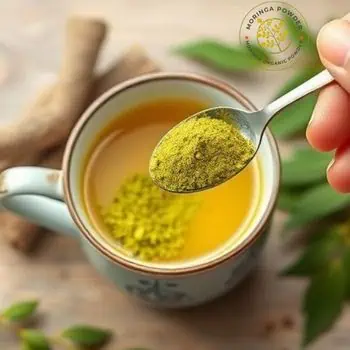
This recipe allows you to savor the natural, earthy flavor of moringa in its purest form.
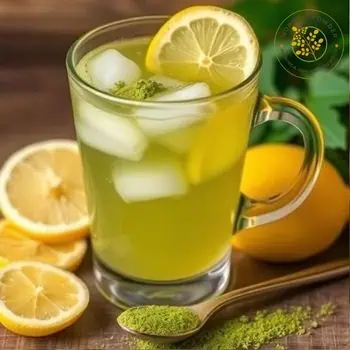
This recipe adds a touch of sweetness and a burst of vitamin C to your moringa tea.
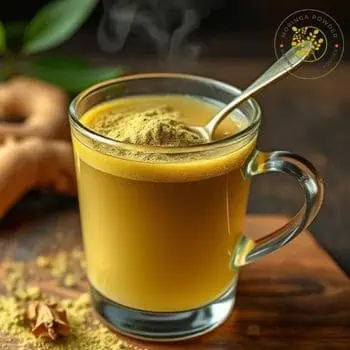
This recipe combines the invigorating spice of ginger with the earthy notes of moringa for a flavorful and potentially beneficial brew.
To make moringa tea a regular habit, try brewing a big batch each morning and storing it in the fridge for easy sipping throughout the day. You can also keep a stash of moringa leaves or tea bags in your desk drawer at work or in your purse for an on-the-go weight loss boost.
While moringa tea is generally considered safe for most people when consumed in normal food amounts, there are a few potential side effects and interactions to be aware of:
Additionally, if you're pregnant or breastfeeding, consult with your healthcare provider before drinking moringa tea, as there is limited safety data for these populations. People with known allergies to plants in the Brassicaceae family (like cabbage and broccoli) should also exercise caution, as they may be more likely to react to moringa.
As with any natural remedy, you must listen to your body and discontinue use if you experience adverse reactions. If you have any concerning symptoms or pre-existing health conditions, always talk to your doctor before trying moringa tea for weight loss.
You might wonder how moringa tea compares to other popular weight-loss beverages like green tea or coffee. While all these drinks have potential benefits, moringa tea stands out for its unique nutrient profile and targeted effects.
Compared to green tea, moringa tea is higher in certain antioxidants like quercetin and chlorogenic acid, which have been linked to improved fat metabolism and reduced inflammation. Moringa tea also contains a broader range of vitamins and minerals, such as iron, calcium, and vitamin A, that can support overall health and vitality during weight loss.
While coffee is known for its metabolism-boosting caffeine content, moringa tea offers a more gentle energy lift due to its balanced nutrient profile. Plus, moringa tea is naturally caffeine-free, making it a good option for those sensitive to stimulants or looking to cut back on caffeine.
Ultimately, the best weight loss tea for you depends on your needs, preferences, and health goals. Moringa tea is worth considering if you're looking for a nutrient-dense, caffeine-free option with targeted fat-burning potential.
When shopping for moringa tea, quality is key. Look for brands that use 100% pure, organic moringa leaves and have transparent sourcing and processing practices. Loose-leaf teas or unbleached tea bags are of higher quality than powdered mixes, which can contain additives or fillers. You can also look for certifications like USDA Organic, Non-GMO Project Verified, or Fair Trade to ensure you get a top-notch product.
Moringa tea is very affordable compared to other weight loss supplements. A package of 30 moringa tea bags typically ranges from $6-$12, depending on the brand and quality. Loose leaf moringa tends to be slightly pricier but allows you to customize your brew strength and can be more economical in the long run.
Moringa tea is a promising option if you're looking for a natural, evidence-based way to support your weight loss journey. With its potent blend of antioxidants, anti-inflammatory compounds, and essential nutrients, this ancient beverage may help regulate appetite, boost metabolism, balance blood sugar, and target stubborn belly fat.
While research on moringa tea for weight loss is still emerging, the available studies suggest it can be a valuable addition to a healthy lifestyle when used in safe, moderate amounts. Remember that no single food or drink is a magic bullet for weight loss—the most sustainable results come from a balanced diet, regular physical activity, and consistent healthy habits over time.
If you're ready to try moringa tea, start slowly, listen to your body, and choose a high-quality product from a reputable source. As with any new supplement, it's always wise to talk to your healthcare provider first, especially if you have any underlying health conditions or take medications.
The best weight loss strategy is the one that works for you in the long term. Whether you decide to steep a daily cup of moringa tea or explore other natural solutions, what matters most is finding an approach that supports your unique needs, preferences, and overall well-being. Here's to brewing up a healthier, happier you!
More Resources: If you'd like to learn more about moringa tea and other natural weight-loss solutions, check out these additional articles:
The Ultimate Guide to Moringa Powder
Moringa Powder Potential Benefits for Women's Health
Shop our selection of premium, organic moringa tea.
Move over, matcha—a new superfood tea in town has the United States buzzing. Meet moringa tea, the energizing, nutrient-packed drink used for centuries in traditional medicine but now getting the attention it deserves in the U.S.
This vibrant green tea, made from the leaves of the "miracle tree" Moringa oleifera, is bursting with antioxidants, vitamins, minerals, and unique plant compounds that offer impressive health benefits, from boosting immunity to promoting weight loss to enhancing brain function.
While moringa has been a staple in Ayurvedic medicine and other holistic healing traditions for generations, American wellness enthusiasts are just starting to realize its incredible potential. As more research emerges supporting moringa's health effects, demand for this super tea is skyrocketing from coast to coast.
So what makes moringa tea so unique, and how can you incorporate it into your daily routine for optimal wellness? In this ultimate guide, we'll dive deep into everything you need to know about this miraculous superfood drink, from its fascinating origins and science-backed benefits to our expert brewing tips and tasty recipes. We'll even cover potential side effects and precautions so you can confidently sip.
Get ready to uplevel your tea game and experience the transformative power of moringa for yourself. Let's steep in!
Moringa tea is a powerhouse beverage made from the leaves of the Moringa oleifera tree, a fast-growing, drought-resistant plant native to the foothills of the Himalayas in northwestern India. In the United States, you may have heard it referred to as the "drumstick tree," "horseradish tree," or "ben oil tree" due to the long, slender shape of its seed pods.
For centuries, moringa has been used in traditional Ayurvedic and Unani medicine to treat a variety of ailments, from skin diseases and joint pain to digestive issues and infections. Due to its impressive nutritional profile and medicinal properties, it's even been called the "miracle tree."
In recent years, moringa tea has been making waves in the U.S. health and wellness scene as more people discover its potential to enhance vitality, support weight management, and promote overall well-being. You can now find moringa tea in most health food stores and online retailers nationwide.
The most common are:
No matter which form you choose, you'll be tapping into the incredible nourishing potential of this super leaf. So, are you ready to discover what makes moringa tea so unique? Keep reading to learn about the science-backed benefits that have more and more Americans reaching for a cup of this miraculous brew.
Get ready to be amazed by the incredible health benefits packed into every cup of tea! This superfood brew is loaded with vitamins, minerals, and antioxidants that work together to support your well-being from head to toe.
Just one teaspoon (5 grams) of moringa leaf powder contains:
In addition to its other benefits, moringa contains an impressive 46 types of antioxidants, including well-known ones like flavonoids, polyphenols, and ascorbic acid (vitamin C). Interestingly, these compounds are known to counteract the damaging effects of free radicals and reduce oxidative stress, a key factor in various chronic diseases.
With this in mind, you might wonder how moringa tea can directly benefit your health. Let's delve into the research-backed advantages that are making moringa tea a popular topic of conversation in American wellness circles. One particularly noteworthy benefit is its support for:
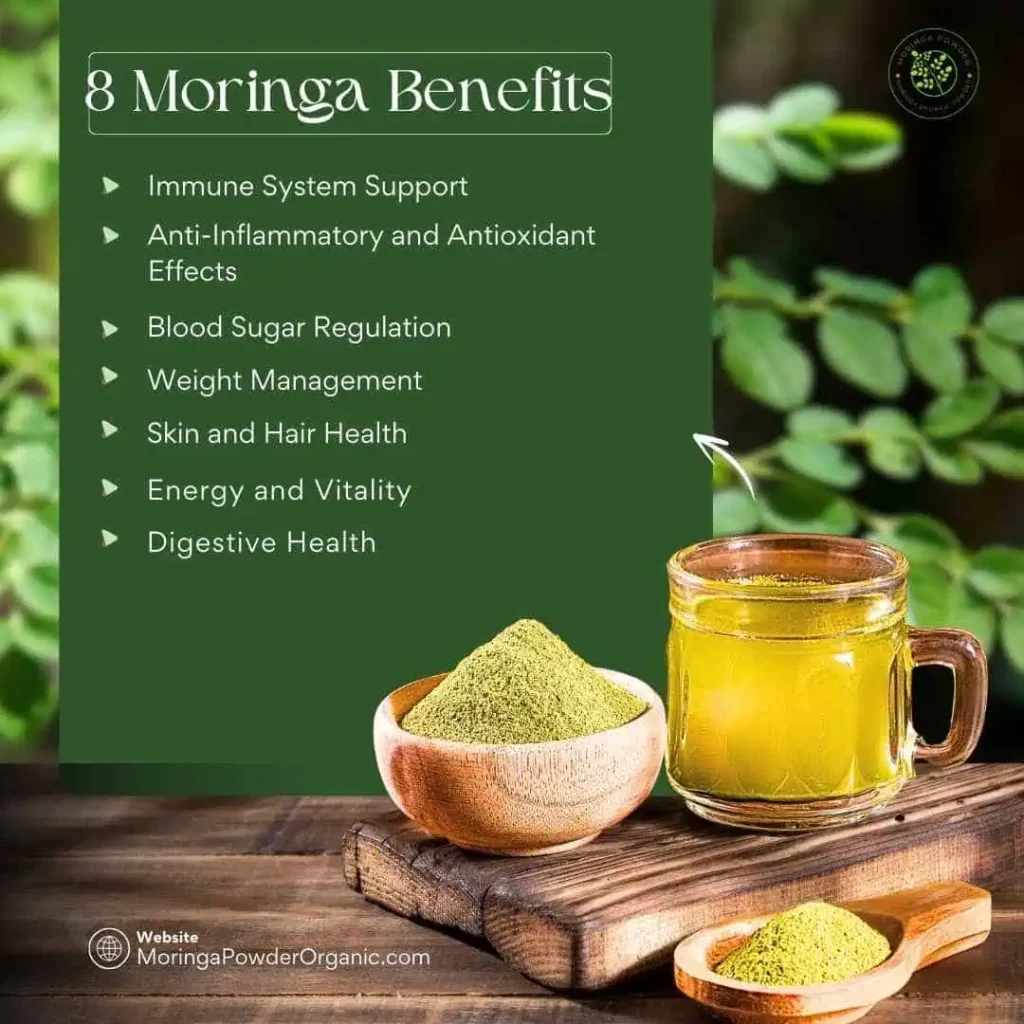
While more human studies are needed to understand the extent of moringa's health benefits fully, the existing evidence is incredibly promising. The FDA has even recognized moringa as a "New Dietary Ingredient," acknowledging its potential to support health and wellness.
So, why not harness the power of this superfood tea for yourself? With its impressive nutritional profile and wide range of potential health benefits, moringa tea is a delicious and easy way to support your well-being naturally. Now that you know what makes this miracle brew special, let's explore how to choose and prepare the perfect cup!
Here's a simple step-by-step guide for each form of moringa tea commonly found in the U.S.:
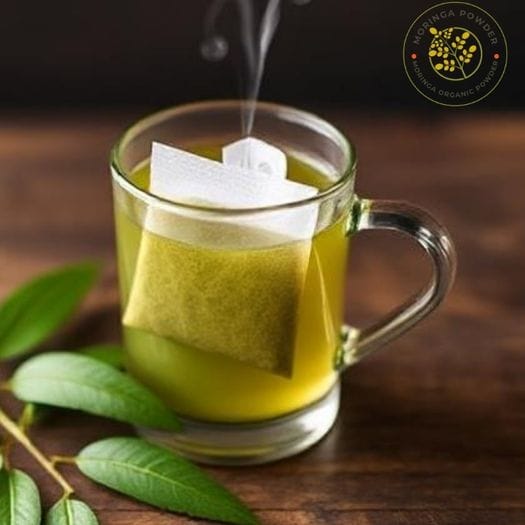
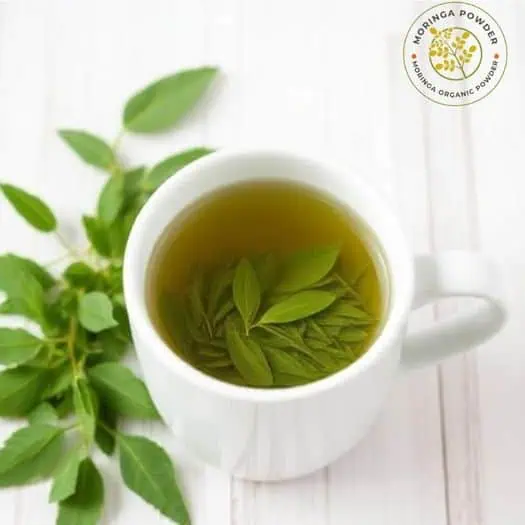
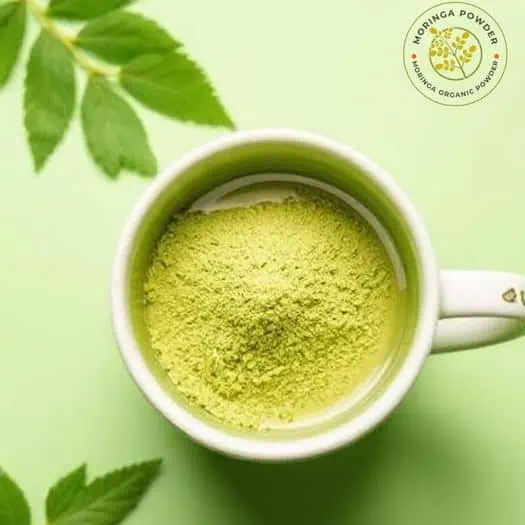
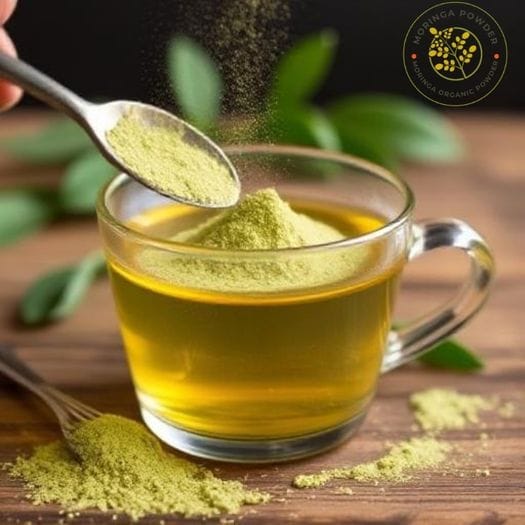
While moringa tea has a pleasant, slightly earthy taste on its own, you can enhance the flavor by adding:
Feel free to experiment with your favorite tea additions to create your perfect cup of moringa goodness!
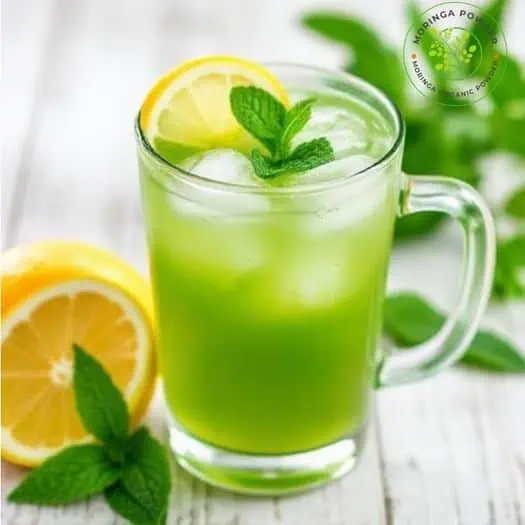
Want to enjoy the benefits of moringa tea on a hot summer day? Try this refreshing iced moringa tea recipe:
Now that you know how to brew the perfect cup of tea, you're ready to start incorporating this superfood beverage into your daily routine. Whether you prefer the convenience of tea bags, the ritual of loose-leaf tea, or the versatility of moringa powder, you'll be reaping the fantastic health benefits with every sip. Cheers to your wellness!
With so many moringa tea options flooding the U.S. market, knowing which one to choose can be overwhelming. But don't worry – we've covered you with this comprehensive buyer's guide to help you select the best moringa tea for your needs and preferences.
In the market U.S., you'll find several types of moringa tea to suit your taste preferences:
Moringa tea is widely available in the United States, both online and in stores. Some popular retailers include:
When shopping online, be sure to read customer reviews and check for any certifications or seals of quality. Don't hesitate to contact the brand directly with any questions about their sourcing, processing, or sustainability practices.
By considering these factors and exploring the various purchasing options, you'll be well-equipped to choose the best moringa tea for your wellness needs and flavor preferences. Whether you opt for a classic plain variety, an energizing flavored blend, or a unique single-origin tea, you can feel confident in the quality and integrity of your moringa tea selection. Happy sipping!
No, this herbal drink is naturally caffeine-free. Made from pure moringa leaves, it's perfect for those sensitive to caffeine or looking to reduce their stimulant intake.
You can enjoy it anytime! Many prefer drinking in the morning or early afternoon for natural energy without caffeine-related effects. Having it 30 minutes before meals may help with blood sugar control and satiety.
The ideal serving varies by individual and health goals, but experts generally recommend 1-2 cups per day. Each serving typically contains about 1 teaspoon (2 grams) of pure moringa leaf powder.
This measured approach helps you find the perfect serving size for your needs while allowing your body to adjust comfortably to the beverage's natural properties.
While this healthy drink can complement your wellness routine, consult your healthcare provider first, especially if you take medication. Moringa can affect blood sugar levels, so professional guidance ensures safe consumption.
Limited research has been done on the safety of moringa tea during pregnancy and breastfeeding, so it's best to err on the side of caution. Some studies suggest that certain compounds in moringa may have uterine stimulant effects, which could potentially lead to complications. If you are pregnant, breastfeeding, or trying to conceive, it's essential to talk to your doctor before consuming moringa tea.
Yes, you can customize your moringa tea to suit your taste preferences! Many people enjoy adding a splash of milk (dairy, almond, coconut, or oat) for a creamier texture or a touch of honey, agave, or maple syrup for natural sweetness. Just keep in mind that adding sweeteners will increase your tea's calorie and sugar content, so it's best to use them in moderation.
To keep your moringa tea fresh and potent, store it in an airtight container in a cool, dry place away from direct sunlight, heat, and moisture. Properly stored, moringa tea can maintain its quality for up to 6 months to a year. Some people prefer to refrigerate or freeze their moringa powder for an even longer shelf life, but this isn't necessary for most store-bought teas.
Remember, while moringa tea is a natural and generally safe beverage for most people, it's always a good idea to listen to your body and consult a trusted healthcare professional if you have any specific concerns or underlying health conditions. With these tips, you can confidently incorporate moringa tea into your wellness routine and enjoy its many potential benefits!
Congratulations – you're now a moringa tea expert! Let's recap what we've learned about this miraculous superfood beverage:
Ready to get started? Visit Amazon.com or your local health food store to stock up on high-quality moringa tea today. Don't forget to sign up for our newsletter at MoringaPowderOrganic.com for exclusive recipes, wellness tips, and special promotions delivered straight to your inbox.
Here's to your health and happiness
Moringa oleifera, commonly known as the "miracle tree," has gained worldwide recognition for its impressive nutrient profile and potential health benefits. As the global market for moringa powder continues to expand, it's crucial for consumers and industry professionals alike to understand the key factors that distinguish high-quality moringa powder from subpar products. This comprehensive guide delves into the essential aspects of selecting premium moringa powder in 2025, including quality indicators, market analysis, certification and testing standards, and a practical purchasing guide.
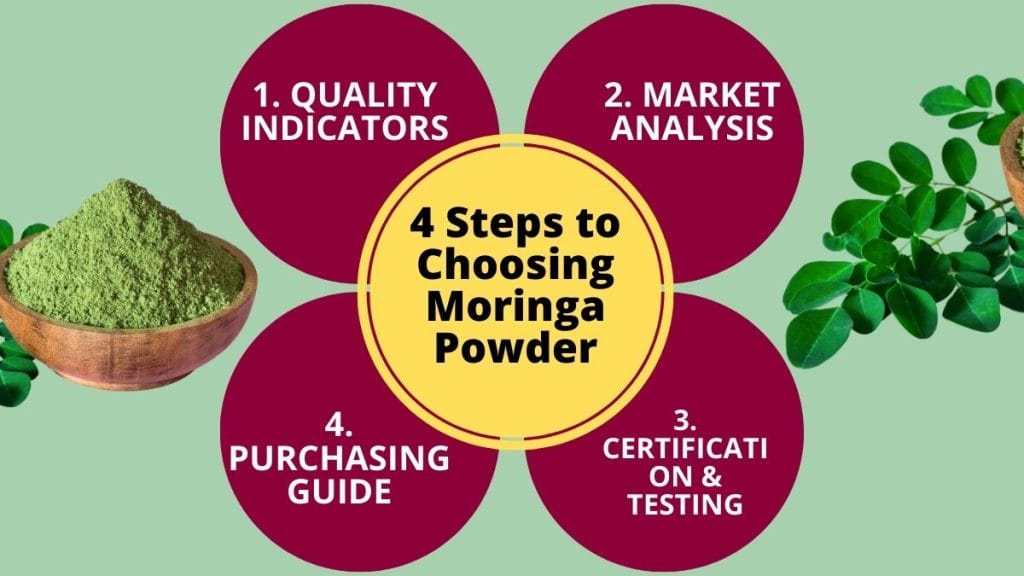
When assessing the quality of moringa powder, several visual, textural, and aromatic characteristics serve as reliable indicators:
A comparative analysis of leading moringa powder brands reveals significant variations in quality, pricing, and market positioning:
Rigorous certification and testing protocols are essential to ensure the safety, purity, and potency of moringa powder:
Armed with an understanding of quality indicators, market trends, and certification standards, consumers can make informed decisions when purchasing moringa powder:
By prioritizing these key factors and staying informed about market trends, consumers and industry professionals can confidently navigate the evolving moringa powder landscape in 2025 and beyond. Investing in high-quality, certified organic moringa powder not only ensures maximum nutritional benefits but also supports sustainable farming practices and ethical supply chains.
Choose the Best Moringa Powder Today! Don't settle for less—discover pure, high-quality Moringa for maximum health benefits. 🌿 Shop Now!
Remember, moringa powder is just one component of a balanced, nutrient-rich diet. Consult with healthcare professionals to determine the appropriate dosage and potential interactions with existing medications or health conditions. With proper selection, storage, and use, moringa powder can be a valuable addition to your wellness regimen, providing a concentrated source of vital nutrients and antioxidants.
Ladies, are you seeking a natural solution to support your unique health needs? Look no further than moringa powder. This superfood has taken the wellness world by storm, and for good reason. Packed with essential nutrients and bioactive compounds, moringa offers targeted benefits for women's health at every life stage. In this comprehensive guide, we'll explore how moringa powder can help you thrive, from your reproductive years through menopause and beyond.
Moringa is a true powerhouse when it comes to women's health. This nutrient-dense plant contains an impressive array of vitamins, minerals, antioxidants, and amino acids that align with women's specific needs. Some key components include:
Unlike many supplements that focus on isolated nutrients, moringa provides a synergistic blend of compounds that work together to nourish and balance the body. Its unique composition targets the root causes of common health issues women face, rather than simply masking symptoms.
During your reproductive years, moringa can be a valuable ally in managing menstrual symptoms and supporting fertility. Its iron content helps replenish blood loss during periods, while its anti-inflammatory properties may ease cramps and bloating. Moringa's nutrient profile also supports healthy egg quality and hormone balance.
Expert Tip: Incorporate moringa powder into your daily routine starting at least three months before trying to conceive to optimize nutrient stores and reproductive health.
Moringa is a pregnancy-safe superfood that can help meet the increased nutritional demands of growing a baby. Its folate content supports neural tube development, while iron and calcium help prevent deficiencies common in pregnancy. Postpartum, moringa can aid in recovery, milk production, and restoring nutrient levels.
As you transition through perimenopause and menopause, moringa offers valuable support for managing symptoms and protecting long-term health. Its calcium and magnesium content helps prevent bone loss, while antioxidants like quercetin may help regulate estrogen levels and reduce hot flashes.
In your post-menopausal years, moringa continues to offer protective benefits. Its anti-inflammatory properties support joint health, while nutrients like vitamin K help maintain bone strength. Moringa's antioxidants also promote healthy aging by fighting free radical damage.
Moringa contains compounds like quercetin and isothiocyanates that help regulate estrogen levels. This can be beneficial for managing PMS, PCOS, and menopausal symptoms. By supporting balanced hormones, moringa may also improve fertility and reduce the risk of estrogen-related cancers.
Moringa's high iron content helps prevent the fatigue and brain fog associated with anemia, a common issue for women. Its B vitamins and magnesium also support energy production and stress resilience, promoting stable moods and mental clarity.
With a rich supply of calcium, phosphorus, and magnesium, moringa supports strong bones and helps prevent age-related bone loss. Its anti-inflammatory properties also soothe joint pain and stiffness, a common concern for women as they age.
Moringa's vitamin C and antioxidant content stimulate collagen production, promoting firm, youthful skin. Its nutrient density also supports lustrous hair and strong nails from the inside out.
Pro Tip: Mix moringa powder into your favorite face mask recipe for an extra dose of skin-nourishing vitamins and minerals.
Moringa's fiber content promotes satiety and balanced blood sugar, making it easier to manage weight. It also boosts metabolism and fat burning, thanks to compounds like chlorogenic acid.
With 3 times the iron of spinach, moringa is an excellent natural solution for preventing and reversing anemia. Pairing moringa with vitamin C-rich foods enhances iron absorption.
A 2024 study published in the Journal of Women's Health found that daily consumption of moringa leaf powder significantly reduced menopausal symptoms like hot flashes and mood swings compared to a placebo group.
Another 2025 study in the American Journal of Obstetrics and Gynecology reported that prenatal supplementation with moringa led to higher birth weights and reduced risk of maternal anemia.
The phytochemicals in moringa, such as isothiocyanates and flavonoids, have been shown to modulate estrogen activity, offering potential benefits for hormone-related conditions like PCOS and breast cancer (Rajput et al., 2023).
Moringa's high calcium bioavailability also makes it a promising tool for preventing osteoporosis in postmenopausal women (Singh et al., 2024).
"As an OB-GYN, I recommend moringa to my patients for its comprehensive benefits across the reproductive lifespan. From supporting fertility and healthy pregnancy to easing menopausal symptoms, moringa is a safe, effective choice for women's health." - Dr. Amita Patel, Integrative Gynecologist
For maximum absorption, take moringa powder in the morning or between meals. Avoid consuming it with foods or supplements that may impair nutrient absorption, such as calcium-rich foods or tea.
Moringa powder is incredibly versatile and can be easily added to:
Pro Tip: Start with 1/2-1 teaspoon per day and gradually increase your intake to allow your body to adjust.
Moringa is generally safe and well-tolerated, but it may interact with certain medications, including:
Consult your healthcare provider before taking moringa if you have any pre-existing health conditions or are taking medications.
Moringa pairs well with other women's health supplements like:
To make moringa a consistent part of your self-care routine:
To preserve moringa's potency and freshness:
While moringa is generally safe for breastfeeding women, it's always best to consult your healthcare provider before starting any new supplement. Moringa may help increase milk production, but it's important to ensure it's compatible with your individual needs.
The timeline for results varies depending on your unique physiology and health goals. Many women report increased energy and reduced inflammation within a few weeks of consistent use. For hormone balance and bone health, benefits may become more apparent after 2-3 months.
There is no known interaction between moringa and hormonal birth control. However, if you're considering using moringa for fertility support, it's important to discuss your plans with your healthcare provider to ensure safe and effective use.
Yes, moringa may be particularly beneficial for women with PCOS due to its hormone-balancing properties. The quercetin in moringa has been shown to improve insulin sensitivity and reduce inflammation, key factors in managing PCOS symptoms. As always, consult your healthcare provider for personalized guidance.
While moringa is highly nutritious, it's not a complete meal replacement. It lacks sufficient calories, protein, and fat to sustain your body's needs. Instead, use moringa as a supplement to a balanced, whole-foods diet for optimal health.
Moringa powder is a true superfood for women's health, offering targeted benefits for every stage of life. From supporting reproductive health and managing menopause symptoms to promoting youthful skin and strong bones, moringa is a safe, effective tool for holistic wellness. By incorporating this nutrient-dense plant into your daily routine, you can tap into its ancient wisdom and modern science to thrive at any age. As with any supplement, be sure to listen to your body and consult your healthcare provider for personalized advice. With consistent use and a nourishing lifestyle, moringa can be a powerful ally on your journey to vibrant health and vitality.
Moringa oleifera, often hailed as a "miracle tree," has exploded in popularity across the US in recent years. As more Americans incorporate moringa powders, teas, and supplements into their wellness routines, it's crucial to understand the potential side effects and safety considerations. In this comprehensive guide, we'll explore the latest research on moringa side effects, share expert insights, and provide clear guidelines for safe usage.
Moringa oleifera is a fast-growing tree native to India, widely cultivated for its nutrient-dense leaves. The leaves contain a potent mix of vitamins, minerals, antioxidants, and plant compounds credited with various health benefits.1 In the US, moringa is commonly found in powders, capsules, teas, and whole leaf form.
The key active compounds in moringa include:2
While generally safe, moringa can cause adverse reactions in some people. The most common side effects include:3
Most side effects are mild and transient, but severe reactions can occur in rare cases. Risk factors include:
Moringa is well-tolerated by most people when used in recommended doses. Start with a low dose and increase gradually to assess your tolerance.
Moringa powder is made by drying and grinding the leaves. It's commonly added to smoothies, soups, or baked goods. Specific risks include:
To stay safe:
Moringa tea is made by steeping dried leaves in hot water. While generally safe, improper preparation can lead to:
Safety tips:
Whole moringa leaves can be used fresh or dried in cooking. Risks include:
Usage guidelines:
Certain populations should exercise extra caution with moringa or avoid it altogether:
Moringa may have labor-inducing and uterine-contracting effects.7 Safety in nursing mothers is unknown. Pregnant and breastfeeding women should avoid moringa supplements and consult their doctor before consuming moringa in food.
Moringa may lower blood sugar and blood pressure.8 People with diabetes, hypoglycemia, or low blood pressure should monitor their levels closely. Those with thyroid disorders should be cautious, as moringa may interfere with thyroid hormones.9
Compounds in moringa may interact with common medications, including:10
Always consult your healthcare provider before taking moringa with medications.
Though rare, allergic reactions to moringa have been reported. Symptoms range from mild (itching, rash) to severe (difficulty breathing, anaphylaxis).11
Use caution if you have related food allergies, such as to:
To minimize side effects and maximize benefits, follow these guidelines:
| Form | Daily Dose |
|---|---|
| Powder | 1-2 tsp (2-4 g) |
| Tea | 1-2 cups (1 tsp per cup) |
| Leaf | 1-2 servings (1/2 cup cooked) |
Start low and increase gradually. Do not exceed recommended dosages unless under medical supervision Maximize your moringa benefits with our dosage calculator.
Choose products that are:
While side effects are usually mild, some warrant medical attention:
Seek immediate medical care for severe or worsening symptoms. Call your doctor if:
A: The recommended daily dose is 1-2 tsp (2-4 g) of moringa powder, 1-2 cups of tea, or 1-2 servings of cooked leaves. Start low and increase gradually.
A: Moringa may interact with certain herbs and supplements, like St. John's Wort, ashwagandha, and garlic.14 Consult your healthcare provider before combining.
A: Eating large amounts of raw moringa leaves is not recommended due to their antinutrient content. It's best to cook them for at least 10 minutes.
A: Yes, moringa grown in contaminated soil may absorb heavy metals like lead and cadmium.15 Choose products from reputable brands that regularly test for contaminants.
Moringa is a nutrient-packed superfood with a good safety profile when used properly. By staying informed, choosing quality products, and following safe usage guidelines, you can minimize potential side effects and enjoy moringa's benefits.
Remember:
For personalized guidance, always consult your trusted healthcare provider. Stay informed with these additional moringa safety resources:
This information is for educational purposes only and is not intended to diagnose, treat, cure, or prevent any disease. Always consult your healthcare provider before taking moringa or any new supplement, especially if pregnant, nursing, chronically ill, or taking medications.
Are you looking for a natural way to boost your energy, support your immune system, and nourish your body with essential nutrients? Look no further than moringa powder - the ultimate superfood that's been used for centuries in traditional medicine and is now taking the US supplement market by storm.
Derived from the nutrient-dense leaves of the Moringa oleifera tree native to parts of Africa and Asia, moringa powder is packed with an impressive array of vitamins, minerals, antioxidants, and plant compounds that work synergistically to support overall health and well-being.
As more Americans discover the incredible benefits of moringa, demand for organic moringa powder supplements has skyrocketed. In fact, the global moringa products market is projected to reach over $8 billion by 2027, with the US as one of the fastest-growing markets.
So what makes moringa powder so special? Just ask Jennifer, a 35-year-old yoga instructor from San Francisco who started taking organic moringa powder daily six months ago. "I have so much more energy and focus throughout the day, and my skin has never looked better," she raves. "Moringa has become an essential part of my wellness routine."
Get ready to experience the transformative power of moringa for yourself! In this comprehensive guide, we'll dive deep into the science-backed benefits of moringa powder, show you how to choose the highest quality organic supplements, and share practical tips and recipes for incorporating moringa into your daily life. Let's get started!
Moringa powder is renowned for its wide-ranging health benefits. To get a quick overview, check out our article on the 10 Amazing Benefits of Moringa Powder. What sets moringa powder apart from other superfood supplements is its exceptional nutrient density.
What sets moringa powder apart from other superfood supplements is its exceptional nutrient density.
Gram for gram, moringa leaves contain:
Moringa is also one of the few plant sources of complete protein, boasting all 9 essential amino acids that the body can't produce on its own. This makes it an ideal supplement for vegans, vegetarians, and anyone looking to boost their protein intake.
But the benefits don't stop there. Moringa is loaded with powerful antioxidants and anti-inflammatory compounds like quercetin, chlorogenic acid, and isothiocyanates. These plant compounds have been shown to protect cells from oxidative stress, support normal inflammatory response, and promote overall health and longevity.
The advantages of moringa go beyond essential vitamins and minerals. It is also abundant in powerful antioxidants and anti-inflammatory compounds such as quercetin, chlorogenic acid, and isothiocyanates. These potent phytochemicals play a vital role in:
Multiple clinical trials have demonstrated moringa's ability to support healthy blood sugar levels. A 2021 study published in the Journal of Functional Foods found that daily supplementation with moringa leaf powder for 3 months led to significant improvements in fasting blood sugar and HbA1c (a long-term marker of blood sugar control) in adults with elevated levels. To learn more about how moringa can be used to manage diabetes, read our comprehensive guide: Moringa and Diabetes.
Moringa leaf powder has been shown to support cardiovascular health by helping to maintain healthy cholesterol levels and blood pressure. A 2020 meta-analysis of randomized controlled trials concluded that moringa supplementation significantly reduced total and LDL (bad) cholesterol, as well as systolic and diastolic blood pressure, compared to placebo.
The unique combination of nutrients in moringa, including vitamin B6, magnesium, and complete protein, helps to boost energy production, reduce fatigue, and speed muscle recovery. In a 2019 study, male athletes who took 900 mg of moringa extract daily for 6 weeks experienced significant improvements in endurance, power, and recovery compared to placebo.
Moringa's potent antioxidants and neuroprotective compounds like vitamins C and E have been shown to support cognitive function and protect brain cells from oxidative stress. Animal studies suggest that moringa may help to improve memory, learning, and mood, and may have potential therapeutic benefits for age-related cognitive decline.
The high content of antioxidants, vitamins, and minerals in moringa supports healthy skin and hair by fighting free radical damage, promoting collagen production, and nourishing follicles. Moringa oil, derived from the seeds, is also commonly used in natural skincare products for its moisturizing and anti-aging properties.
So how does moringa stack up against other popular superfood supplements like matcha, acai, and spirulina? While each of these offers unique benefits, moringa stands out for its exceptional nutrient density and wide range of evidence-backed health effects.
| Nutrient (per 100g) | Moringa | Matcha | Acai | Spirulina |
|---|---|---|---|---|
| Protein (g) | 27.1 | 30.0 | 8.1 | 57.5 |
| Fiber (g) | 19.2 | 29.8 | 44.2 | 3.6 |
| Calcium (mg) | 2,003 | 520 | 260 | 120 |
| Iron (mg) | 28.2 | 16.4 | 4.4 | 28.5 |
| Vitamin A (IU) | 18,640 | 17,000 | 1,000 | 570 |
| Vitamin C (mg) | 17.3 | 60.8 | 0.2 | 10.1 |
As you can see, moringa tops the charts for essential minerals like calcium and iron, while providing an excellent balance of protein, fiber, and antioxidant vitamins. It's a true nutritional powerhouse!
With so many moringa powder supplements on the market, it can be tricky to know which ones are worth your hard-earned dollar. Here are the key factors to look for to ensure you're getting the highest quality, most effective product:
Choose moringa powders that are certified organic and non-GMO to avoid potentially harmful pesticides, herbicides, and genetically modified ingredients. Look for the USDA Organic seal or other reputable third-party certifications.
Make sure the supplement is made from 100% pure moringa oleifera leaf, without any fillers, additives, or artificial ingredients. The only ingredient on the label should be organic moringa leaf powder.
To maximize the bioavailability of nutrients, the moringa leaves should be shade-dried at low temperatures and then carefully milled into a fine powder. Avoid supplements that use high-heat processing or extraction methods, which can degrade beneficial compounds.
The fresher the moringa powder, the more potent and effective it will be. Look for supplements that are packaged in airtight, opaque containers and have a recent manufacture date or expiration date clearly printed.
Choose moringa supplements from reputable brands that are transparent about their sourcing, processing, and quality control practices. Read customer reviews and look for any red flags like unsubstantiated health claims or negative side effects.
While high-quality moringa powder supplements are more expensive than lower-grade options, you don't have to break the bank to reap the benefits. Look for products that offer at least 100 grams of pure organic moringa leaf powder at a reasonable price point - ideally between $15 to $30.
Now that you know how to choose the best moringa supplements, let's explore some practical tips and techniques for incorporating this superfood into your daily routine.
The recommended daily dosage of moringa powder varies depending on your age, weight, and health status. As a general guideline, start with 1-2 teaspoons (2-4 grams) per day and gradually increase up to 1-2 tablespoons (10-20 grams) as desired.
Here is a handy moringa dosage calculator to help you find your ideal daily amount:
| Weight (lbs) | Daily Dosage (tsp) | Daily Dosage (g) |
|---|---|---|
| Less than 150 lbs | 1-2 tsp | 2-4 g |
| 150-200 lbs | 2-3 tsp | 4-6 g |
| More than 200 lbs | 1-2 tbsp | 10-20 g |
For best results, take moringa powder consistently for at least 4-6 weeks to allow the nutrient levels to build up in your system. If you're pregnant, nursing, or have any pre-existing health conditions, consult with your healthcare provider before adding moringa to your supplement regimen.
Moringa powder is incredibly versatile and can be easily incorporated into a variety of recipes and beverages. Here are some simple and delicious ways to use it:
• Smoothies and juices: Add 1-2 teaspoons of moringa powder to your favorite smoothie or green juice recipe for a nutrient boost. The slightly earthy, green flavor pairs well with tropical fruits like mango, pineapple, and coconut.
• Hot beverages: Whisk 1 teaspoon of moringa powder into hot water, herbal tea, or your morning coffee for an energizing elixir. You can also add coconut oil, honey, or lemon to taste. For a dedicated moringa tea experience, explore our guide to brewing and enjoying Moringa Tea.
In Meals:
No matter how you choose to take it, the key is to be consistent and make moringa a regular part of your wellness routine. Many people prefer to take it first thing in the morning on an empty stomach for maximum absorption, but you can experiment with different times of day to see what works best for your body and schedule.
From boosting immunity and enhancing energy levels to promoting healthy skin and digestion, moringa powder offers a plethora of benefits. It's a natural and powerful way to enhance your overall well-being.
Furthermore, if weight management is one of your wellness goals, you might be interested in reading more about Moringa Tea For Weight Loss.
Ready to experience the transformative power of moringa? Start by finding your perfect dosage with our Moringa Dosage Calculator, or using our Moringa Dosage Calculator button! Take the first step towards a healthier you today!
To maintain the potency and freshness of your moringa powder, proper storage is essential. Here are some tips:
By following these simple storage guidelines, you can ensure that your moringa powder stays fresh and effective for as long as possible.
The scientific community has taken a keen interest in moringa in recent years, with a growing body of research supporting its potential health benefits. Here's a quick overview of some of the most promising findings from the last few years:
Dr. Josh Axe, DNM, DC, CNS, a leading natural health expert and clinical nutritionist, is a big proponent of moringa powder. "Moringa is one of the most nutrient-dense plants on the planet," he says. "It's a great source of plant-based protein, vitamins, minerals, and antioxidants that can help to nourish and detoxify the body."
According to registered dietitian and nutritionist Jenna Gorham, RD, LN, moringa is an excellent choice for people looking to support their overall health and wellness. "Moringa is a true superfood that offers a wide range of benefits, from boosting energy and immunity to supporting healthy digestion and skin," she says. "It's a simple and convenient way to pack more nutrition into your day."
While the current body of research on moringa is promising, there is still much to learn about its potential health benefits and mechanisms of action. Some areas of ongoing and future research include:
As more high-quality studies are conducted, we can expect to gain an even deeper understanding of how this incredible plant can support human health and well-being. In particular, research highlights the specific benefits of Moringa Powder for women, addressing various aspects of their health journey.
While moringa is generally safe and well-tolerated, there are a few important considerations to keep in mind before adding it to your supplement routine.
Moringa leaf powder is considered safe for most people when consumed in recommended amounts. However, some people may experience mild digestive side effects like nausea, bloating, or diarrhea, particularly when first starting out with higher doses.
If you have any pre-existing health conditions or are taking medications, it's important to talk to your healthcare provider before taking moringa, as it may interact with certain drugs or exacerbate certain conditions. For example, moringa may lower blood sugar and interfere with diabetes medications, or lower blood pressure and interact with antihypertensive drugs.
Pregnant and breastfeeding women should also exercise caution with moringa, as there is limited safety data in these populations. While moringa leaf powder is likely safe in food amounts, it's best to avoid concentrated supplements or extracts unless under medical supervision.
As with any dietary supplement, it's important to listen to your body and discontinue use if you experience any adverse reactions or concerning symptoms.
Moringa powder can be a beneficial addition to almost anyone's wellness routine, but it may be especially helpful for:
• Vegans and vegetarians looking to boost their protein and nutrient intake
• Athletes and active individuals seeking to enhance performance and recovery
• Older adults at risk for nutrient deficiencies or age-related health concerns
• People with digestive issues looking to support gut health and regularity
• Anyone seeking to support healthy immune function, energy levels, and overall wellness
Ultimately, the decision to take moringa powder is a personal one that should be made in consultation with your healthcare team. By weighing the potential benefits and risks, you can determine if this superfood is right for your unique needs and goals.
If you're ready to experience the benefits of moringa for yourself, you have plenty of options for purchasing high-quality supplements in the US. Here are some of the best places to buy organic moringa powder:
Expect to pay around $15-30 for 8-16 oz of high-quality organic moringa powder. Cost per ounce goes down with larger quantities. Capsules generally cost more per serving.
Moringa is harvested year-round in tropical climates, so availability is steady in the US. Some brands may offer seasonal specials or fresh-harvest batches.
Look for moringa powder with these seals:
✅ USDA Organic
✅ Non-GMO Project Verified
✅ Vegan Society Approved
✅ Gluten-Free/Kosher/Halal Certified
Here is a comparison table of moringa powder versus other popular superfood powders:
| Nutrient | Moringa | Matcha | Spirulina | Maca | Acai |
|---|---|---|---|---|---|
| Serving Size | 1 tsp (5g) | 1 tsp (2g) | 1 tbsp (3g) | 1 tbsp (8g) | 1 tbsp (10g) |
| Price per Serving | $0.30-$0.60 | $0.45-$0.90 | $0.30-$0.45 | $0.45-$0.75 | $0.60-$1.20 |
| How to Use | Powder (drinks, capsules) | Powder (drinks, food) | Powder (drinks, food, capsules) | Powder (drinks, food, capsules) | Powder (drinks, smoothies, capsules) |
| Calories | 15-20 kcal | 5-10 kcal | 10-15 kcal | 30-40 kcal | 50-70 kcal |
| Protein | 9g | 4g | 8g | 4g | 2g |
| Fiber | 2g | 1g | 1g | 3g | 7g |
| Iron (%DV) | 58% | 10% | 44% | 16% | 10% |
| Calcium (%DV) | 15% | 5% | 2% | 10% | 2% |
| Magnesium (%DV) | 10% | 5% | 3% | 15% | 5% |
| Zinc (%DV) | 2% | 1% | 1% | 3% | 1% |
| Vitamin A (%DV) | 80% | 60% | 12% | 0% | 0% |
| Vitamin C (%DV) | 35% | 0% | 0% | 0% | 2% |
| Vitamin B complex | B1, B2, B6 | B1, B2 | B1, B2, B12 | B1, B2, B6 | B1, B2 |
| Cautions | - Nut allergies - Consult doctor if pregnant/breastfeeding | - May affect iron absorption - Avoid excessive consumption | - Algae allergies - May affect blood clotting | - Thyroid conditions | - May affect blood clotting |
| Quality/Certifications | Look for certified organic, toxin-free | Look for certified organic, check origin | Look for certified organic, check origin | Look for certified organic, check origin | Look for certified organic, check origin |
| Origin | India, Africa | Japan | Hawaii, China | Peru | Brazil |
Note:
Unique benefits Complete protein, bone health, energy Focused energy, antioxidants Detoxification, muscle strength Hormonal balance, energy Brain health, heart health
Moringa powder stands out as the most nutrient-dense superfood, providing high levels of key vitamins and minerals plus complete protein not found in the others. Its unique combination supports energy, bone health and overall wellness.
Of course, the other superfoods offer their own targeted benefits. The key is choosing the one that aligns with your health goals. But for an all-around nutritional powerhouse, moringa is hard to beat! Let me know if you have any other questions.
Ready to get started?
Shop Organic Moringa] >>>
The incredible health benefits of moringa are too good to pass up. With this ultimate guide, you now have everything you need to make the most of this nourishing superfood. Whether you're looking for a natural energy boost, digestive support, or a daily dose of greens, moringa powder has you covered. So go ahead and add a scoop to your smoothie or try a moringa latte - your body will thank you. Here's to your super health powered by moringa!